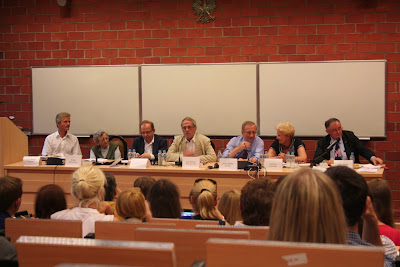“If we want real international legal change, the super powers can’t be afraid to step in.”
Professor Krzysztof Motyka
Today’s discussions opened up a myriad of religious, ethical, and political questions with regards to the Solidarity movement in Poland. Our first lecturer, Professor Krzysztof Motyka from John Paul II Catholic University of Lublin discussed the origins of the human rights legal system. For me, a human rights law student, this talk was of particular interest. In his lecture, I was most interested in his discussion of the effectiveness of the UN Declaration of Human Rights as a legal tool. He argued that it historically it has been an effective means to enforce what he referred to as “negative rights”, essentially the basic rights to life, but doesn’t accommodate more progressive rights such as healthcare, educational rights, and others. Upon reflection, I questioned how effective the UN Declaration of Human Rights was at enforcing even these more basic or “negative” rights. In US Courts, the soft language of the Declaration, and later documents such as the International Covenant on Civil and Political Rights (ICCPR), has made it more difficult to hold foreign nations accountable for their human rights violations under the alien tort statute. One such example is Sosa v. Alvarez-Machain, where a loophole in international law allowed a DEA to escape punishment for his torture of a Mexican national. Reversing this trend of poor international legal accountability will require, as Professor Motyka said, “a multilateral movement” in international courts.
Additionally, another thought-provoking debate came up during the fellow’s talk was the discussion over universalism vs. moral relativity in the realm of human rights. This debate was originally sparked during the Human Rights Conference organized by the University of Warsaw a few days ago and resurfaced during Professor Andrzej Rychard’s discussion on Poland’s Solidarity today. While Professor Rychard discussed several different aspects of the Solidarity movement, given my background in philosophy, this was the topic I was most interested in. At its core, the debate came down whether human rights were universal, or whether they varied depending on the cultural, era, and other factors; and also how we should act on them. We ultimately settled for a resigned amalgamation of the two. Personally however, I found myself going against the consensus of the human rights conference--which was in full support of enforcing the universality of human rights, by leaning towards moral relativism. While I certainly believe in the universality of right to life and other basic liberties, I don’t believe that human rights intervention should occur on rights that lack international consensus, or rights that a sovereign free nation has decided it’s opposed to. For example, an LGBT campaign in Saudi Arabia would be an absolute disaster and would probably impinge its cause.
In fact, as we discussed in the fellows talk, it appears far more effective when powerful “progressive” countries bring more repressive countries into the fold economically and overlook their human rights violations. One such example is Nixon in China during the 60s. Through his brilliant diplomacy, he strategically engaged China economically, overlooking political and human rights violations. Decades later, despite violations against the Uyghur and Tibetan people, China has moved much further into the mainstream. Ultimately, I believe that this sort of “Moral Relativist Diplomacy” is what is needed in the Middle East and elsewhere to engage countries on economic issues, and indirectly change their human rights policies.
































